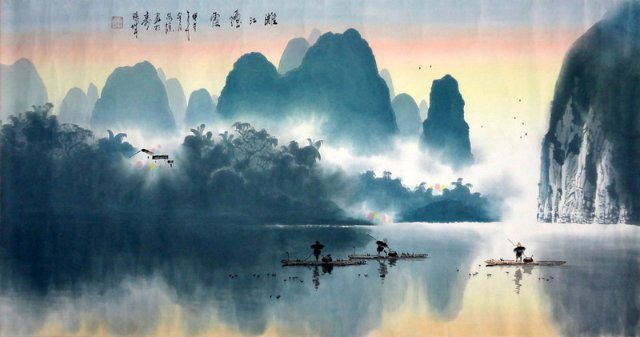The Flow
By: Cheng Tong - Jun 17, 2024
No forcing hand, no clenched fist tight,
Let go of struggle, find the light.
Like water dancing, swift and clear,
Wu Wei’s flow, release all fear.
(Part 2 on the Meaningfulness of Wu Wei)
Wu Wei (pronounced woo-way), a cornerstone of Daoist philosophy, is often mistakenly translated as “doing nothing.” This simplistic interpretation misses the profound essence of the concept. Wu Wei literally translates to “without action” or “without effort,” but its true meaning lies in effortless action and alignment with the natural flow of the universe.
Imagine a mighty river carving its path through mountains. It doesn’t force its way through the rock; it patiently erodes it over time. This is the essence of Wu Wei. It’s about working in harmony with the natural order, understanding that some things unfold best when we don’t rigidly control every aspect.
So, how does Wu Wei translate into the complexities of daily life? Here are some key ways it can bring greater peace, efficiency, and fulfillment:
- Letting Go of Attachment: Often, we fixate on specific outcomes, leading to stress and frustration when things don’t go according to plan. Wu Wei encourages us to release attachment to results and focus on the present moment. This doesn’t mean giving up on goals, but rather approaching them with a sense of trust and openness to unexpected possibilities.
- Effortless Action: Wu Wei isn’t about laziness, but about acting with a sense of ease and flow. When we’re aligned with the right action, it feels effortless, almost like we’re simply a vessel through which things happen. This can be experienced in activities like playing music, writing, or engaging in a deep conversation – a state often referred to as “being in the zone.”
- Acceptance and Adaptation: Life is full of change. Wu Wei encourages us to accept the inevitable ebb and flow of circumstances and adapt our actions accordingly. Imagine a skilled sailor navigating a storm. They don’t fight against the wind, but use their sails to adjust and move with its force. In the same way, Wu Wei teaches us to find opportunities within challenges.
- Inner Peace and Reduced Stress: By letting go of the need to control outcomes, Wu Wei fosters a sense of inner peace. We become less reactive to external events and more accepting of what is. When we stop pushing against the current, life becomes less stressful and allows for a deeper appreciation of the present moment.
- Intuition and Following the Flow: Wu Wei encourages us to cultivate our intuition and trust our gut feeling. Sometimes, the best course of action isn’t readily apparent, but by being present and attuned to the situation, we can sense the right way forward. Imagine a bird effortlessly navigating through a forest; it doesn’t have a map, but it follows an intuitive understanding of the environment.
- Harmonious Relationships: Wu Wei reminds us that relationships thrive on a sense of flow and mutual respect. When we try to force things or manipulate outcomes in interactions, it can lead to disharmony. By allowing relationships to unfold naturally and acting with kindness and understanding, we cultivate stronger connections.
Applying Wu Wei in Everyday Life:
While Wu Wei is a philosophical concept, it has practical applications across various aspects of life:
- Work: Approach tasks with a sense of focus and flow, letting go of the need to micromanage every detail. Trust your skills and be open to creative solutions that emerge in the moment.
- Decision-Making: Don’t rush into choices. Gather information, consider your options, and trust your intuition to guide you towards the best path.
- Creativity: When creating, avoid forcing inspiration. Allow yourself to be present, experiment freely, and see where the process takes you.
- Problem-Solving: Don’t get bogged down by a problem. Take a step back, consider different perspectives, and sometimes, the solution will present itself organically.
Living with the Flow
Wu Wei is a lifelong journey, not a destination. It’s about cultivating a sense of ease and harmony in the face of life’s complexities. By embracing its principles, we can learn to flow with the current, navigate life’s rapids with greater grace, and find a deeper sense of peace and fulfillment along the way. Remember, it’s not about doing nothing, but about doing things in the right way, at the right time, and with the right energy. As Laozi, also spelled Lao Tzu, the imputed author of the Dao de Qing, said, “The master who governs modifies nothing. Yet all things are perfected by themselves.”

